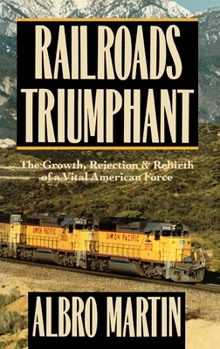Railroads Triumphant: The Growth, Rejection, and Rebirth of a Vital American Force
Select Format
Select Condition 
Book Overview
In 1789, when the First Congress met in New York City, the members traveled to the capital just as Roman senators two thousand years earlier had journeyed to Rome, by horse, at a pace of some five miles an hour. Indeed, if sea travel had improved dramatically since Caesar's time, overland travel was still so slow, painful, and expensive that most Americans lived all but rooted to the spot, with few people settling more than a hundred miles from the ocean (a mere two percent lived west of the Appalachians). America in effect was just a thin ribbon of land by the sea, and it wasn't until the coming of the steam railroad that our nation would unfurl across the vast inland territory.
In Railroads Triumphant, Albro Martin provides a fascinating history of rail transportation in America, moving well beyond the "Romance of the Rails" sort of narrative to give readers a real sense of the railroad's importance to our country. The railroad, Martin argues, was "the most fundamental innovation in American material life." It could go wherever rails could be laid--and so, for the first time, farms, industries, and towns could leave natural waterways behind and locate anywhere. (As Martin points out, the railroads created small-town America just as surely as the automobile created the suburbs.) The railroad was our first major industry, and it made possible or promoted the growth of all other industries, among them coal, steel, flour milling, and commercial farming. It established such major cities as Chicago, and had a lasting impact on urban design. And it worked hand in hand with the telegraph industry to transform communication. Indeed, the railroads were the NASA of the 19th century, attracting the finest minds in finance, engineering, and law.
But Martin doesn't merely catalogue the past greatness of the railroad. In closing with the episodes that led first to destructive government regulation, and then to deregulation of the railroads and the ensuing triumphant rebirth of the nation's basic means of moving goods from one place to another, Railroads Triumphant offers an impassioned defense of their enduring importance to American economic life. And it is a book informed by a lifelong love of railroads, brimming with vivid descriptions of classic depots, lavish hotels in Chicago, the great railroad founders, and the famous lines. Thoughtful and colorful by turn, this insightful history illuminates the impact of the railroad on our lives.
In Railroads Triumphant, Albro Martin provides a fascinating history of rail transportation in America, moving well beyond the "Romance of the Rails" sort of narrative to give readers a real sense of the railroad's importance to our country. The railroad, Martin argues, was "the most fundamental innovation in American material life." It could go wherever rails could be laid--and so, for the first time, farms, industries, and towns could leave natural waterways behind and locate anywhere. (As Martin points out, the railroads created small-town America just as surely as the automobile created the suburbs.) The railroad was our first major industry, and it made possible or promoted the growth of all other industries, among them coal, steel, flour milling, and commercial farming. It established such major cities as Chicago, and had a lasting impact on urban design. And it worked hand in hand with the telegraph industry to transform communication. Indeed, the railroads were the NASA of the 19th century, attracting the finest minds in finance, engineering, and law.
But Martin doesn't merely catalogue the past greatness of the railroad. In closing with the episodes that led first to destructive government regulation, and then to deregulation of the railroads and the ensuing triumphant rebirth of the nation's basic means of moving goods from one place to another, Railroads Triumphant offers an impassioned defense of their enduring importance to American economic life. And it is a book informed by a lifelong love of railroads, brimming with vivid descriptions of classic depots, lavish hotels in Chicago, the great railroad founders, and the famous lines. Thoughtful and colorful by turn, this insightful history illuminates the impact of the railroad on our lives.
Format:Hardcover
Language:English
ISBN:0195038533
ISBN13:9780195038538
Release Date:January 1992
Publisher:Oxford University Press
Length:448 Pages
Weight:1.75 lbs.
Dimensions:1.6" x 6.5" x 9.6"
Customer Reviews
3 ratings
One of the best general railroad history books out there
Published by Thriftbooks.com User , 18 years ago
Albro Martin has a wonderful style of writing which makes this a great read - even better than Enterprise Denied. It details how railroads have not only survived, but continue to play a vital part in our everyday lives, even though we see less and less of them today.
Best Railroad General History
Published by Thriftbooks.com User , 18 years ago
I read a lot of railroad history, and this is the best general history of American railroading that I know of.
Great Overview of Why Railroads have come back from the dead
Published by Thriftbooks.com User , 28 years ago
Railroads Triumphant has given me an excellent history as to why railroads died, and why they are coming back. The author's explanation of the various forms of governmental intervention and how they led to the railroad's demise were enlightening. The Stagger's Act of 1980 clearly was the defining moment when the government stopped micro-managing the railroads and allowed them to serve the public again. I highly reccomend this book to anyone who thinks that railroading is dead! I also reccomend it to anyone who thinks that governmental control is good for the public..






